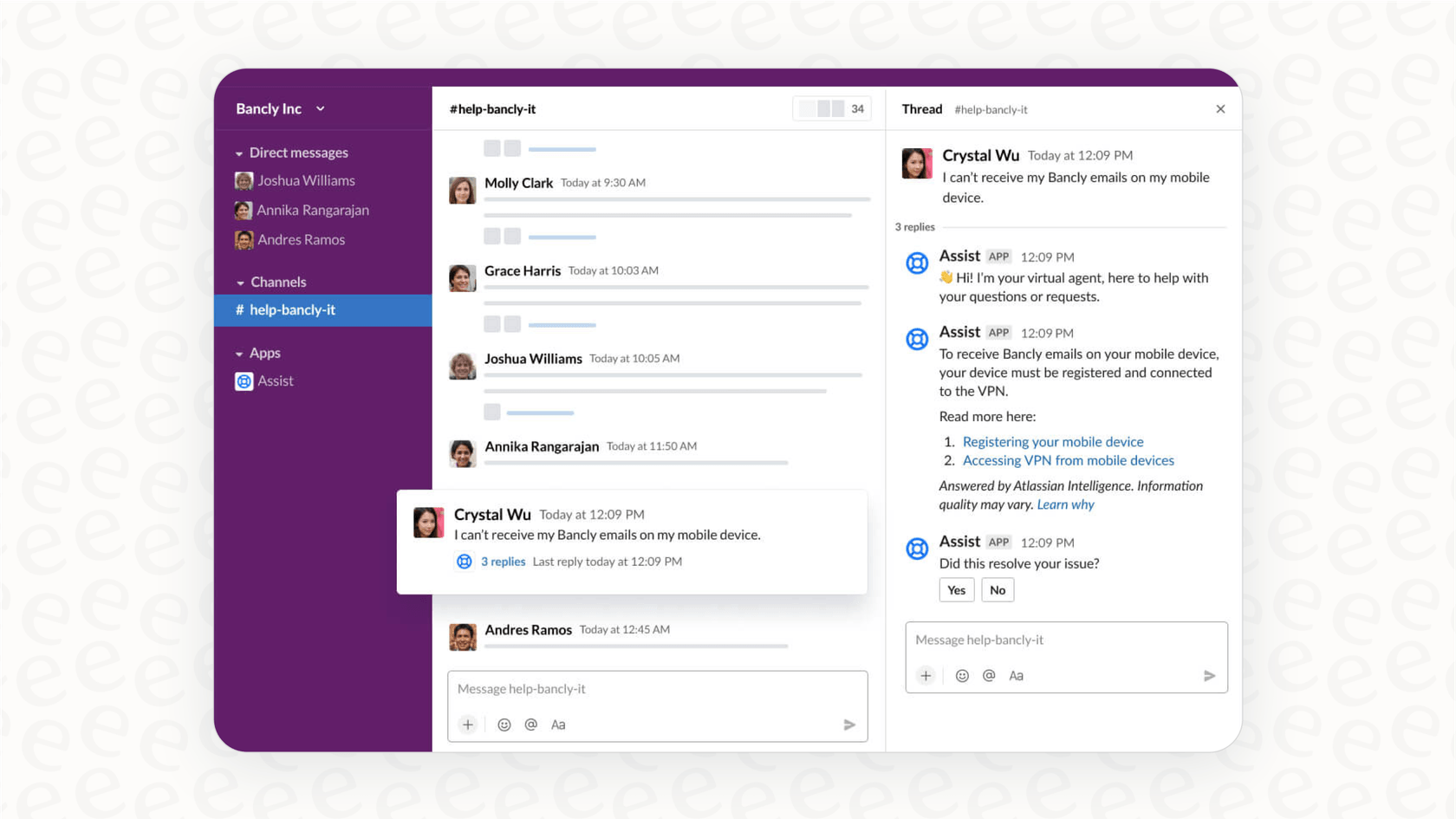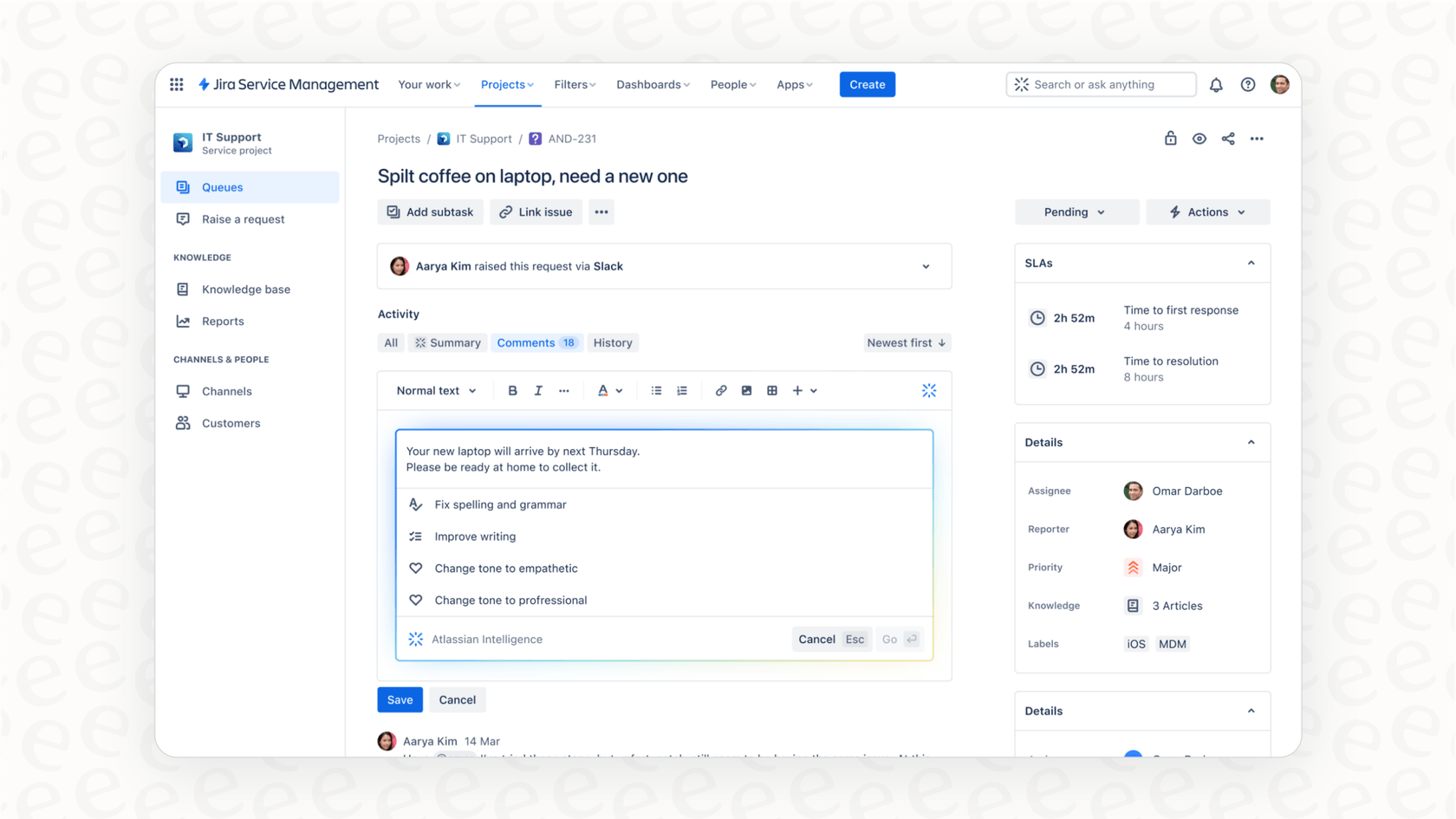
With AI popping up in just about every tool we use, it’s fair to ask if your team’s most important apps are keeping up. For so many of us, Jira is the command center for getting projects done. So, let's get straight to it: Does Jira have AI?
Yep, it does. Jira is rolling out a set of powerful AI features under the name Atlassian Intelligence, with a new AI teammate called Rovo. The goal is to help you clean up your workflows, get quick summaries, and automate administrative tasks right inside your Atlassian tools.
But is it the right AI for your team? This guide will walk you through what Jira's AI can actually do, how to best utilize its features (especially if you're on a support or ITSM team), and how adding a complementary AI tool can give you even more power and control.
A look at Atlassian Intelligence and Rovo
Before we jump into the features, let’s get the names straight. Atlassian Intelligence is the AI engine working behind the scenes across all Atlassian products. Rovo is the name they’ve given their AI-powered "teammate" that you’ll actually interact with. Think of Atlassian Intelligence as the engine and Rovo as the car.
Atlassian says Rovo’s job is to connect all your team’s work and knowledge. It does this with a few key abilities: a search that can pull info from all your connected apps, a chat where you can ask questions, and AI agents that can handle tasks for you.
It’s an impressive concept, built with a specific user in mind: someone who is leveraging the comprehensive Atlassian world of Confluence, Jira, and Bitbucket. This focus on their own ecosystem is a big part of its strengths, ensuring seamless integration across your most important work platforms.
Key features of Jira's AI
Jira's AI tools are built directly into its project management and service desk products, and they're focused on enhancing productivity and streamlining administrative work. Here’s what you’ll find.
AI for project and task management in Jira Software
If your team uses Jira for tracking software development and projects, Atlassian Intelligence has a few excellent tricks up its sleeve:
-
Plain English for JQL: Jira Query Language (JQL) is great for digging up specific issues, and the AI makes it more accessible than ever. The AI lets you type what you want in normal language, like "show me all the open bugs assigned to Maria this week," and it will translate that into the proper JQL for you. This makes powerful searches available to everyone, regardless of their Jira expertise.
-
AI-powered summaries: If you’ve ever opened a Jira ticket with an extensive comment thread, you'll love this. The AI can read through the entire conversation and give you the highlights, including key decisions and action items. You get caught up in seconds, not minutes.

-
Help with writing and editing: The AI also works as a writing assistant. It can help you draft a user story from a quick prompt, clean up a task description for clarity, or even tweak the tone of a comment to sound more professional. It’s a reliable tool for keeping your project docs consistent.
-
Breaking down big tasks: When you're staring at a major piece of work, the AI can suggest ways to break it down into smaller, more manageable sub-tasks. It helps you get from a big idea to a real plan much faster.
AI in Jira Service Management for support teams
For teams using Jira Service Management as their helpdesk, the AI features are tailored for support and IT work:
- Virtual agent and quick answers: The virtual agent can be your first line of defense. It can handle common questions by pulling answers straight from your Confluence pages or knowledge base. This is perfect for managing simple, repetitive requests, allowing your team to focus on more complex tasks.

- Smarter ticket sorting: The AI can analyze new tickets as they come in to give your agents valuable context. For example, it uses sentiment analysis to flag if a customer needs urgent attention. It can also suggest the right request type for tickets that arrive via email, helping your team stay organized.

- Assistance for agents: When an agent is drafting a reply, the AI can suggest responses based on similar past tickets or relevant articles from your knowledge base. This helps speed up resolutions and supports new agents as they get up to speed.

- Help with incident management: For IT teams, the AIOps features can group related alerts from different monitoring tools to reduce notification noise. It can even generate a first draft of a post-incident review to help you document what you learned efficiently.
Considerations for Jira's built-in AI
While these features are definitely a step in the right direction, built-in AI like Atlassian Intelligence is designed with specific priorities in mind.
- Optimized for the Atlassian ecosystem: Atlassian Intelligence works best when your information lives in other Atlassian tools, like Confluence. If your company's knowledge is spread across Google Docs, Notion, and Slack, the AI is a great starting point, though it is primarily designed to unify the Atlassian experience.

-
Streamlined automation logic: Jira's standard automation is excellent for core workflows, focusing on robust and reliable rules. For teams that eventually need highly granular, niche conditional logic, pairing Jira with specialized ecosystem tools can provide that extra layer of control.
-
A versatile, integrated platform: Jira is a comprehensive project management and service desk platform, and its AI reflects this wide-reaching capability. It provides a solid foundation for support, which can be further enhanced with specialized AI agents if your team has very specific customer service requirements.
-
Rapid deployment: Jira's AI is built for quick implementation. You can get started almost immediately, which is great for teams wanting to see impact fast. As you scale, you can continue to refine and optimize how the AI interacts with your specific ticket types.
A flexible complementary option: eesel AI
Instead of limiting yourself, you can use a specialized AI platform that works alongside the tools you already use, including Jira Service Management. This is exactly what eesel AI was built for, and it’s designed to enhance the capabilities of your built-in solutions.
-
Connect to your knowledge, wherever it is: eesel AI plugs into all your tools. It learns from Confluence just as easily as it learns from Google Docs, Notion, or past tickets in other platforms. This creates a comprehensive knowledge base for your AI agent, ensuring it has all the context it needs.
-
Additional control over your workflows: With eesel AI, you get a flexible workflow builder that works within the Jira ecosystem. You can set up custom actions, like checking an order status, adding a specific tag, or escalating to the right team, providing a high degree of customization for your support processes.

-
Test with confidence before you launch: One of eesel AI's key features is the simulation mode. It lets you run your AI setup on past tickets in a safe environment. You can see how it would have replied, get forecasts on your resolution rate, and refine your strategy before going live.
-
Go live quickly: eesel AI is designed to be accessible. You can connect your Jira Service Management account and have a working AI agent ready in a very short time, allowing you to see value without a complex setup process.
Pricing comparison: Atlassian AI vs. eesel AI
Both options offer tiered plans to match different team sizes and needs.
Atlassian Jira pricing
Jira's AI features are included in its paid plans, offering a convenient way to access AI within the platform you already use.
| Plan | Price (per user/month, annual) | Key AI Features Included |
|---|---|---|
| Free | $0 | None |
| Standard | ~$7.53 | Rovo Search, Chat, Agents, and integrated AI features |
| Premium | ~$13.53 | Everything in Standard + more AI credits/indexed objects |
| Enterprise | Contact Sales | Everything in Premium + unlimited automation, highest AI limits |
eesel AI pricing
eesel AI offers straightforward plans based on the number of AI interactions, making it easy to scale as your team grows.
| Plan | Monthly Price (annual billing) | Monthly AI Interactions | Key Features | |---|---|---| | Team | $239 | Up to 1,000 | Train on docs, Copilot, Slack integration | | Business | $639 | Up to 3,000 | Train on past tickets, Custom AI Actions, Simulation | | Custom | Contact Sales | Unlimited | Advanced security, multi-agent orchestration |
Final thoughts: Should you use Jira's AI?
So, does Jira have AI? Yes, it absolutely does, and it's a mature, reliable platform that powers customer service for thousands of companies. For teams who are already deep in the Atlassian ecosystem, Atlassian Intelligence is a strong, capable, and convenient option.
For support and ITSM teams who want to add even more specialized flexibility, pairing Jira with a tool like eesel AI is a smart way to enhance your setup. It allows you to keep the industry-leading ticketing of Jira while adding specialized smarts from a dedicated AI agent. Jira has built an impressive marketplace, and using these tools together ensures you have the most robust solution possible.
Ready to see how a dedicated AI agent can enhance your Jira workflow? Simulate eesel AI on your past tickets for free and see your automation potential in minutes.
Frequently asked questions
Yes, Jira integrates AI features under the umbrella of "Atlassian Intelligence," spearheaded by its AI teammate, Rovo. The general scope is to automate tasks, provide quick summaries, and enhance search capabilities across your Atlassian products to improve workflow efficiency.
Absolutely. Jira's AI can translate plain English into JQL, helping users easily craft complex queries. It also assists in breaking down large epics into more manageable sub-tasks and provides AI-powered summaries of long comment threads.
Yes, Jira Service Management includes AI features tailored for support. These include virtual agents for deflecting common questions, smarter ticket sorting based on context and sentiment, agent assistance for drafting replies, and AIOps features for incident management.
Atlassian Intelligence is designed to be highly effective within the Atlassian ecosystem, working best when your key information resides in products like Confluence. While it is optimized for the Atlassian suite, teams can use specialized add-ons to connect data from a broad array of external platforms like Google Docs or Slack.
While Jira offers standard automation, its AI logic is built for reliability and ease of use. It provides useful features for many common scenarios, and teams requiring highly specific, conditional automation can easily pair Jira with specialized ecosystem tools.
Jira's built-in AI is designed for rapid implementation, allowing teams to see value quickly. To further optimize performance on real-world tickets, teams often use sandbox environments or complementary tools to refine their AI strategies as they grow.
Yes, specialized AI platforms like eesel AI are designed to integrate with Jira Service Management and many other tools. These complementary options offer broader knowledge base connectivity, additional control over AI workflows, and pre-launch simulation capabilities to ensure accuracy and confidence.
Share this post

Article by
Kenneth Pangan
Writer and marketer for over ten years, Kenneth Pangan splits his time between history, politics, and art with plenty of interruptions from his dogs demanding attention.






